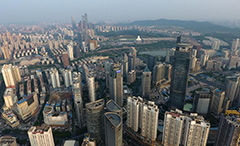China steps up property controls in smaller cities amid market divergence
2017-05-23
Xinhua
BEIJING — With housing prices and sales stagnating in China’s major cities following tough property controls, smaller cities are starting to join in.
Last weekend, property sales were restricted in several second- and third-tier cities, as speculators shift their attention to these areas. Around 30 cities have introduced sales restrictions to different extents.
In Baoding, a city in north China’s Hebei province, certain properties are subject to a 10-year lock-up period before they can be resold.
In Jiaxing, a city in East China’s Zhejiang province, non-residents will not be able to resell houses within two years of buying them.
With such restrictions, speculators who use borrowed money to invest may have to reconsider, as it now takes much longer for the houses to generate returns and pay back the loans, said Zhang Dawei, an analyst with Centaline Property.
Smaller cities have become the main battleground as China strives to contain housing price rises through restrictions on purchases and increased minimum down payments. In Beijing, for example, the down payment ratio for second homes was raised to 60 percent in mid-March, a measure considered “unprecedented.”
Dozens of cities now have price caps and credit limits.
Latest data showed that the curbs may be taking effect. In 30 of 70 large and medium-sized cities surveyed, price rose more slowly year on year in April, six more cities than in March, according to the National Bureau of Statistics (NBS). Prices in 31 cities declined in April or grew more slowly in April, said the NBS.
The trend in smaller cities is quite different. In April, prices for new houses in third-tier cities expanded 0.4 percentage points faster than March, with smaller cities such as Qinhuangdao and Baotou leading the gains.
“Control of the housing market in major cities has had a spillover effect on smaller cities, boosting demand,” said Ding Zuyu, chief executive of E-House China, a real estate agent.
Extending restrictions from major cities to nearby smaller cities can relieve the spillover somewhat and avoid irrational speculation in these cities, said Ding.
In an interview with Xinhua last month, Ning Jizhe, vice head of the national economic planner, said while progress had been made in containing the housing market, there were still some “deep-rooted structural problems.”
“There is still upward price pressure in first and second tier cities, and it will take a long time for third and fourth-tier cities to digest their inventories,” he said.
Once curbs are relaxed, prices are likely to rise again, he said.
To maintain long-term stability, an expansion of anti-risk policies such as those seen over the weekend, is very likely, analysts said.
According to Zhang, property sales restrictions will soon expand to more than 50 cities, with many third and fourth-tier cities to be included.


